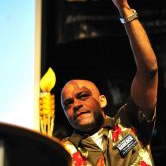 In the opening minutes of Mayor Michael Hancock’s administration, he promised in his inaugural speech “to build even stronger partnerships with our metro neighbors…to ensure our forward progress is progress for all.” After just two short years in office, the collaborative regionalism that area businesses, government leaders, and economic development officers love to promote is grinding to a slow halt.
In the opening minutes of Mayor Michael Hancock’s administration, he promised in his inaugural speech “to build even stronger partnerships with our metro neighbors…to ensure our forward progress is progress for all.” After just two short years in office, the collaborative regionalism that area businesses, government leaders, and economic development officers love to promote is grinding to a slow halt.
Animosity over the mayor’s plan for an “airport city” development project on Denver land that was granted to the city has caused Adams County officials to take the drastic step of demanding the land back that was annexed by Denver under a 1988 intragovernmental agreement. And Hancock escalated the situation by calling his neighbors’ proposal “a joke” and accused them of “25-year-old history and dislike for Denver.” We’re not sure if this is exactly what Hancock when he announced his dedication to “build even stronger partnerships” with the city’s regional neighbors.
This weekend the Denver Business Journal ran two pieces (here and here) on the fractured regional cooperation of the past two years. In addition to Hancock’s controversial airport project, the proposed Gaylord Hotel project in Aurora is threatening to further divide lawmakers, business owners, and the economic development community.
At issue is an $81 million tax incentive package that was granted to a Gaylord Entertainment resort-hotel project before the company underwent significant changes to its ownership and legal structure that essentially left the business unit that would manage this project under the ownership of Marriott. With millions of dollars passing through the region’s hotels for conferences on an annual basis, it is no surprise that a confederation of 19 regional hotels have now made a formal request to the Metro Denver Economic Development Corporation to cancel the massive tax incentive.
The Denver Business Journal asserts that these hotly contested issues could be detrimental to future regional projects such as the northern expansion of FasTracks and associated issues, such as construction defects legislation that has hampered condo development around proposed FasTracks sites. Mike Fitzgerald, who serves as CEO of the Denver South Economic Development Partnership, was quoted in one of the DBJ articles stating that he has “already heard from corporate site selectors who are concerned that regional cooperation won’t be as reliable in the future.”
Hancock’s leadership around these issues has faded into the background since his disparaging quotes ran in the Denver Post this June. Aurora Mayor Steve Hogan seems to be out in front of these issues now, most recently addressing the EDC at a meeting held on July 25th. The region needs a strong mayor in Denver’s city hall to foster partnerships and collaboration in this area of the state.
It is sadly apparent that Hancock does not seem up to the task.

Good thing Colorado has this CPP…I have asked for years…what is Denver's surplus…I see Denver is$540,000,000 in the red..cocouncilman Lopez told me on FB..that Denver surplus of $540,000,000
This is what is of major concern.